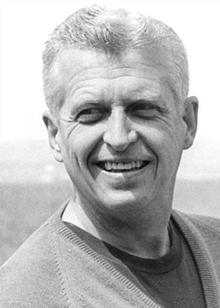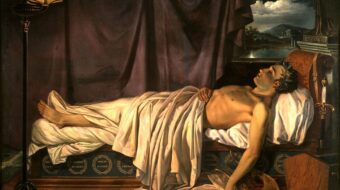
Philip Francis Berrigan, American peace activist and former Roman Catholic priest, was born on this date in 1923 in the mining town of Two Harbors, Minn. Among his five brothers was the Jesuit fellow-activist and poet, Daniel Berrigan. His mother Frieda was deeply religious and his father Tom was a second-generation Irish-Catholic, trade union member, socialist and railway engineer.
After high school Philip also worked on trains, for the New York Central Railroad, and played semi-professional baseball. In 1943 he was drafted into combat duty in World War II and served in the Battle of the Bulge.He was deeply affected by his exposure to the violence of war and the racism of boot camp in the South.
Berrigan graduated from the College of the Holy Cross, a Jesuit university in Worcester, Mass. In 1950 he joined the Society of St. Joseph, better known as the Josephite Fathers, a religious society of priests and lay brothers dedicated to serving people of African descent. He was ordained a priest in 1955, and went on to earn teaching degrees.
Standing with the urban poor, Berrigan became active in the civil rights movement, marching for desegregation and participating in sit-ins and bus boycotts. He was first imprisoned in 1962-63.During his many prison sentences he would often hold bible study class and offer legal educational support to other inmates. In 1964 he founded the Catholic Peace Fellowship in New York City. His activism and arrests met with deep disapproval from the leadership of the Catholic Church.
Berrigan began taking increasingly radical steps to bring attention to the Vietnam War. The group known as the “The Baltimore Four” occupied the Selective Service Board in the Customs House, Baltimore, on Oct. 27, 1967, performing a sacrificial protest bypouring blood over draft board records and distributing copies of the New Testament. Berrigan was sentenced to six years in federal prisons.
After his release on bail, Berrigan repeated the protest in a modified form. Nine activists, known as the Catonsville Nine and including his Jesuit brother Daniel, walked into the offices of the local draft board in Catonsville, Md., removed 600 draft records, doused them in napalm and burnt them in a lot outside the building.The Nine, all Catholics, issued a statement accusing the religious bodies of America of “silence and cowardice in the face of our country’s crimes. We are convinced that the religious bureaucracy in this country is racist, is an accomplice in this war, and is hostile to the poor.”
Berrigan was convicted of conspiracy and destruction of government property on November 8, 1968. After appeals that went to the U.S. Supreme Court all nine were sentenced to three years in prison.
As the Vietnam War dragged on, Berrigan and others in the “Catholic Left” continued with a series of nonviolent actions meant to draw attention to the immorality of the war. They recalled the history of martyrdom and personal witness to sustain their passionately held beliefs, not fearing jail time that awaited them. Much of their focus was against the Dow Chemical Company, manufacturer of napalm, and draft boards that filled their quotas with poor men of color. Over time, a few of their cases were dismissed by sympathetic judges.
Still a priest, Berrigan married former nun Elizabeth McAlister in 1970, although the marriage was not revealed until 1973. Together they founded Jonah House in Baltimore, a community to support resistance to war.
The Berrigan brothers and six others began the Plowshares Movement, and on Sept. 9, 1980,the “Plowshares Eight” entered the General Electric Nuclear Missile Re-entry Division in King of Prussia, Penn., where nose cones for the Mark 12A warheads were made. They hammered on two nose cones, poured blood on documents and offered prayers for peace. In April 1990, after nearly ten years of trials and appeals, the Plowshares Eight were re-sentenced and paroled for up to 23 months in consideration of time already served in prison.Berrigan’s last Plowshares action occurred in December 1999, when a group of protesters hammered on A-10 Warthog warplanes at the Warfield Air National Guard Base. He was indicted for malicious destruction of property and sentenced to 30 months in prison.
In his lifetime he had spent about 11 years in jails and prisons for civil disobedience. He also wrote half a dozen books about his experiences in prison and in the revolutionary movement.
In one of his last public statements, Berrigan said, “The American people are, more and more, making their voices heard against Bush and his warrior clones. Bush and his minions slip out of control, determined to go to war, determined to go it alone, determined to endanger the Palestinians further, determined to control Iraqi oil, determined to ravage further a suffering people and their shattered society. The American people can stop Bush, can yank his feet closer to the fire, can banish the war makers from Washington, D.C., can turn this society around and restore it to faith and sanity.”
Phil Berrigan died in 2002 at the age of 79.
Adapted from Wikipedia.












Comments